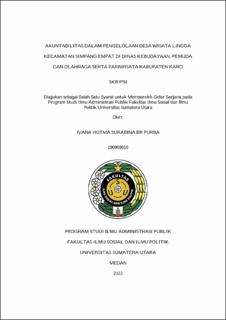| dc.description.abstract | Tourism villages are one of the tourism potentials that store various historical relics and can be enjoyed by anyone. The existence of a tourist village that is still maintained today shows that the culture in an area is still highly valued. However, in its implementation, the Karo Regency Department of Culture, Youth and Sports and Tourism is still trying with limited capacity. Although the management of tourism destinations is a priority policy in Karo Regency, as the authority in managing tourist destinations, the Karo Culture, Youth and Sports and Tourism Office is still not accountable for the tasks carried out. For this reason, this study aims to determine and describe the accountability of the management of Lingga Tourism Village, Simpang Empat District.
The research method used in this study is a descriptive research method with a qualitative approach. Data collection is carried out by interview, observation, and documentation techniques. Data was obtained and analyzed qualitatively with theory from Koppel (Wicaksono, 2015) which includes transparency, obligation, control, responsibility and responsiveness.
Based on the analysis of Koppel's theory (Wicaksono, 2015) shows that the Department of Culture, Youth and Sports and Tourism has provided openness by utilizing social media through posts related to the current condition of Lingga Tourism Village, but for the preparation of the program there has not been any openness between related parties. Then, the obligation indicator illustrates that the government has made programs to increase community participation, maintain cleanliness and sustainability of tourist attractions. However, there is still a lack of procurement of facilities and infrastructure, repair and maintenance of tourist destinations. Furthermore, the third is control where the government is still unable to control finances accountably and the government still has minimal visits to Lingga Tourism Village. Fourth is responsibility which shows that in carrying out government activities still refers to regulations that have been regulated, although in implementation it still needs to be reaffirmed. Then the responsiveness has not shown good results, where the needs of the public have not been met. | en_US |





